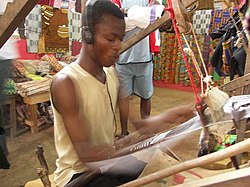Stripweave


Stripweave is a textile technique in which large numbers of thin strips of cloth are sewn together to produce a finished fabric. Most stripweave is produced in West Africa from handwoven fabric, of which the example best known internationally is the kente cloth of Ghana.[1]
The earliest evidence of this traditional technique dates to the eleventh century among the Tellem people of Mali.[2]
Materials
[edit]Cotton, silk, and rayon are the usual fibers for stripweave garment production.[1] Traditionally these were hand spun, although machine spun synthetics are coming into increasing use.[2] Wool is also in use for stripweave blankets by the Fulani people in Mali.[1][2]
References
[edit]- ^ a b c John Gillow and Bryan Sentance (1999). World Textiles: A Visual Guide to Traditional Techniques. Thames & Hudson. p. 92.
- ^ a b c John Gillow (2003). African Textiles. Chronicle Books. p. 29. ISBN 978-0-8118-4166-5. Retrieved 2009-02-14.


 French
French Deutsch
Deutsch